Foreign News
At least eight dead after major rioting and unrest in Papua New Guinea
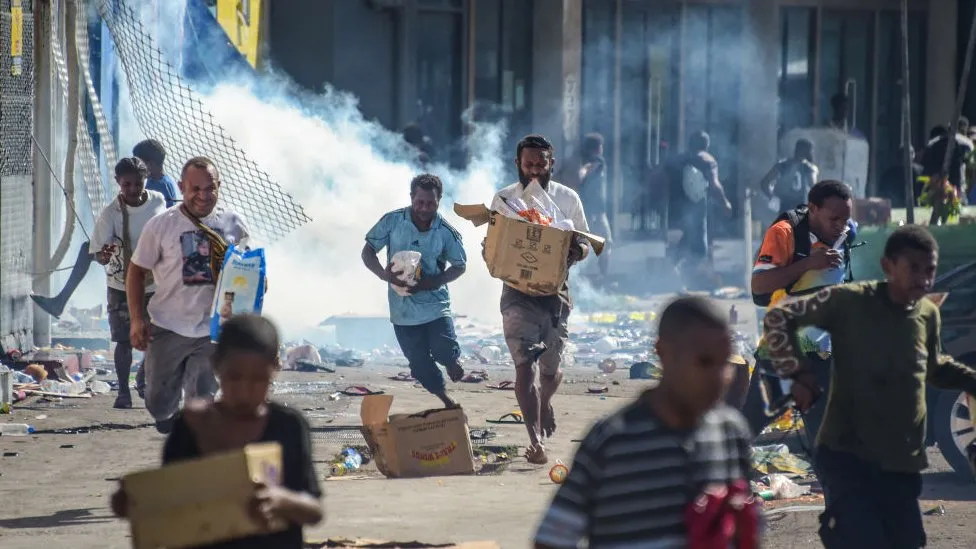
At least eight people have died after major rioting and unrest hit Papua New Guinea’s capital, Port Moresby.
Shops and cars were set on fire and supermarkets looted after police went on strike over a pay dispute. Hundreds had taken to the streets on Wednesday.
In the aftermath, Prime Minister James Marape addressed the nation saying lawlessness would not be tolerated. “Breaking the law does not achieve certain outcomes,” he told the public on Thursday.
The army has been deployed to restore order and while most of the the riots had died down by Wednesday night, Marape acknowledged: “It’s still tense out there”.
A local official had earlier said that the looting had largely been carried out by “opportunists”.
“We have seen unprecedented level of strife in our city, something that has never happened before in the history of our city and our country,” National Capital District Governor Powes Parkop said in a radio address on Wednesday, according to a Reuters report. He had confirmed that “some people sadly lost their life today” though he did not give a number of dead.
The Port Moresby General Hospital had confirmed eight deaths, regional media reported.
The violence had also spread outside the capital – another seven people died in the city of Lae, local police said. The extent of violence in the second-largest city of Papua New Guinea was unclear.
The unrest was triggered after police and other public servants staged a protest strike outside parliament on Wednesday, after discovering their pay had been reduced by up to 50%.
Prime Minister James Marape said up to about $100 (£78) had been deducted from the pay-checks of public servants because of a computer glitch, and the government was not raising taxes as claimed by some protesters. “Social media picked up on this wrong information, misinformation,” said Mr Marape, according to the New York Times, adding that people had taken advantage of police being off the streets.
TV footage showed large crowds and looting across the city. A large shopping centre was among the buildings set on fire.
Ambulance officials said they had attended to several shooting injuries, while the US embassy reported shots near its compound.
The Chinese embassy has also lodged a complaint with the PNG government, saying several Chinese businesses were attacked and a number of Chinese nationals injured – though they did not specify how many. “The Chinese Embassy in Papua New Guinea has lodged solemn representations with the Papua New Guinea side over the attacks on the Chinese shops,” the embassy said on WeChat.
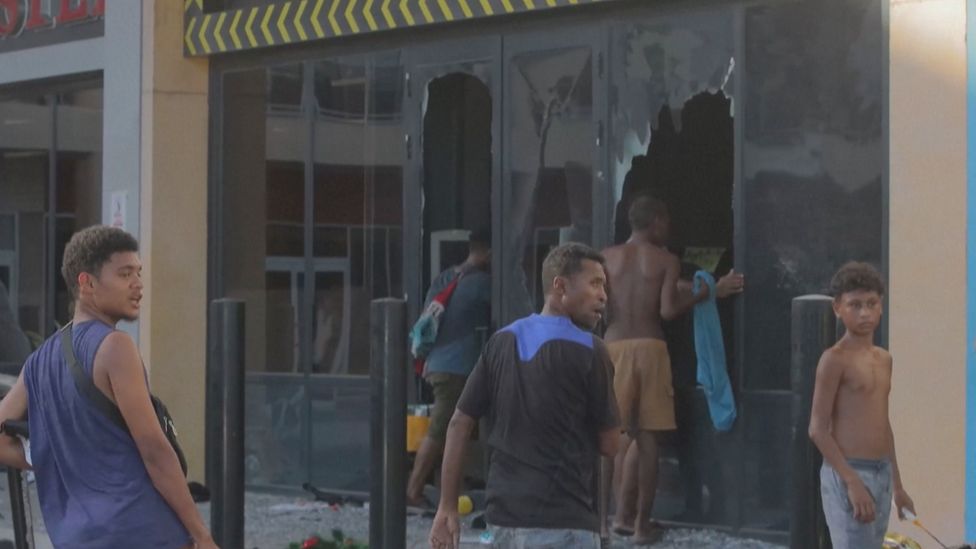
Australia, a neighbouring and major security partner for PNG, on Thursday called for calm in the country. Mr Marape, who met with Australia’s leader last month, has yet to ask for peacekeeping help from the country.
Amid an economic slump in his country that has seen higher inflation and unemployment rates, the prime minister has faced increased pressure. The opposition been working to cast a place a vote of no confidence against him.
Analysts say the unhappiness among the population had led to Wednesday’s unrest in the capital, home to about 400,000 people.
“The events of today in Port Moresby are manifesting and revealing the inner social and economic pains and suffering of police, military and other public servants of PNG, as well as all workers and ordinary people,” PNG Think Tank analyst Samson Komati told the Australian Broadcasting Corporation.
(BBC)
Foreign News
1,329 tiny snails released on remote island
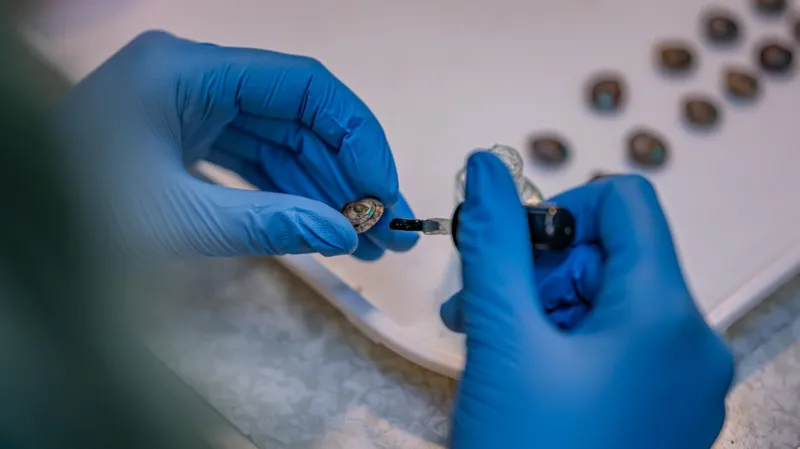
More than 1,300 pea-sized, critically endangered snails that were bred in a zoo have been set free to wander (very slowly) on a remote Atlantic island.
The release brings two species of Desertas Grande Island land snails back to the wild. Prior to this they were believed to be extinct – neither species had been spotted for a century.
When a team of conservationists found a small population surviving on the rocky cliffs of Desertas Grande island, close to Madeira, they mounted a rescue effort.
The snails were brought to zoos in the UK and France, including Chester Zoo, where a home was created for them in a converted shipping container.

The tiny molluscs are native to the windswept, mountainous island of Desertas Grande, just south-east of Madeira. Habitat there has been destroyed by rats, mice and goats that were brought to the island by humans.
It was thought that all these invasive predators had eaten the tiny snails to extinction. Then a series of conservation expeditions – between 2012 and 2017 – proved otherwise.
Conservationists discovered just 200 surviving individuals on the island.
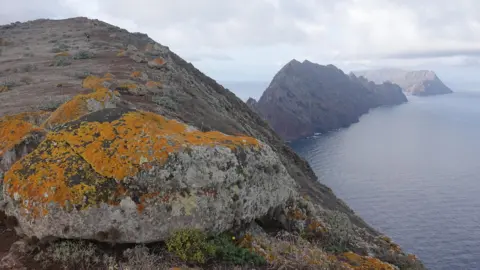
Those snails were believed to be the last of their kind, so they were collected and brought into captivity.
At Chester Zoo, the conservation science team made a new home for 60 of the precious snails. The right food, vegetation and conditions were recreated in miniature habitat tanks.
1,329 snail offspring, bred at the zoo, have now been marked with identification dots – using non-toxic pens and nail varnish – and transported back to the wild for release.
“It’s a colour code,” said Dinarte Teixeira, a conservation biologist at Madeira’s Institute for Nature Conservation and Forests. “This will allow us to spot them and track where they disperse to, how much they grow, how many survive and how well they adapt to their new environment.”
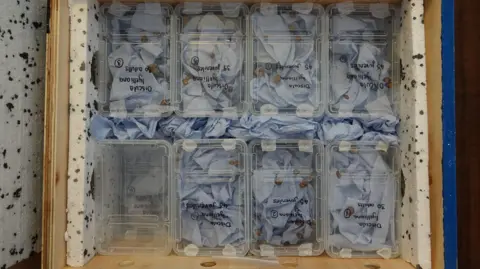
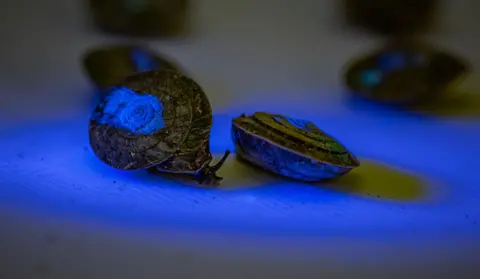
A wild refuge has been restored for the snails on Bugio, a smaller neighbouring island in the Ilhas Desertas (Desert Islands) archipelago. Bugio is a nature reserve and invasive species have been eradicated there.
Gerardo Garcia from Chester Zoo said that the reintroduction was “a major step in a species recovery plan”.
“If it goes as well as we hope, more snails will follow them next spring. It’s a huge team effort which shows that it is possible to turn things around for highly threatened species.”

“These snails are such an important part of the natural habitat [on the islands they come from],” explained Heather Prince from Chester Zoo. As well as being food for other native species, she explained, snails break down organic matter and bring nutrients to the soil.
“They help plants grow. All of that is dependent on the little guys – the insects and the snails that so often get overlooked.”
[BBC]
Foreign News
Azerbaijan says plane hit by ‘external interference’ over Russia before crash

Azerbaijan’s transport minister has said the Azerbaijan Airlines plane that crashed on 25 December was subjected to “external interference” and damaged inside and out, as it tried to land in Russia’s southern republic of Chechnya.
“All the survivors without exception stated they heard three blast sounds when the aircraft was above Grozny,” said Rashad Nabiyev.
The plane is thought to have come under fire from Russian air defence systems before being diverted across the Caspian Sea to Kazakhstan, where it crashed with the loss of 38 lives.
The Kremlin has refused to comment, but the head of Russia’s civil aviation agency said the situation in Grozny was “very complicated” at the time and a closed-skies protocol had been put in place.
“Ukrainian combat drones were launching terrorist attacks on civilian infrastructure in the cities of Grozny and Vladikavkaz,” said Dmitry Yadrov, head of Rosaviatsia, in a video statement posted on Russia’s Tass news agency.
“Because of this a ‘Carpet plan’ was introduced in the area of Grozny airport, providing for the immediate departure of all aircraft from the specified area,” he said. “In addition, there was dense fog in the area of Grozny airport.”
Later on Friday White House spokesperson John Kirby told reporters that the US had seen “early indications” that the plane may have been downed by Russian air defence, but declined to comment further.
The Washington Post reported Kirby had said the indications the US had seen went beyond the widely-circulated photos of the damaged plane.
Ukrainian presidential spokesman Andriy Yermak has said Russia must be held responsible.
Azerbajian Airlines said on Friday that a preliminary inquiry had blamed both “physical and technical external interference”, without going into details.
However, aviation experts and others in Azerbaijan believe the plane’s GPS systems were affected by electronic jamming and it was then damaged by shrapnel from Russian air-defence missile blasts.
The transport minister said investigators would now examine “what kind of weapon, or rather what kind of rocket was used.”
The government in Baku has so far avoided directly accusing Russia, possibly to avoid antagonising President Vladimir Putin.
However, pro-government MP Rasim Musabekov was clear: “The plane was shot down over Russian territory, in the skies above Grozny. Denying this is impossible.”
He told AFP news agency the plane had been damaged and the pilot had asked to make an emergency landing in Grozny. Instead of being directed to nearby airports, he said it was “sent far away” across the Caspian Sea without GPS.
Flight attendant Zulfuqar Asadov described the moments when the plane was hit by “some kind of external strike” over Chechnya. “The impact of it caused panic inside. We tried to calm them down, to get them seated. At that moment, there was another strike, and my arm was injured.”
Veteran Azerbaijani pilot Tahir Agaguliev told Azerbaijani media that shrapnel had damaged the hydraulics that controlled the plane: “The missile itself did not hit the plane; it was shrapnel from the missile that struck. The missile exploded about 10m (30ft) away, before reaching the plane.”
The pilots of the Embraer 190 plane are credited with saving 29 of those on board by managing to land part of the plane, despite themselves being killed in the crash.
The Kremlin has refused to comment on the increasing number of reports that the Azerbaijan Airlines plane was hit by Russian air defence.
“An investigation into this aviation incident is underway and until the conclusions are made as a result of the investigation, we do not consider ourselves entitled to give any assessments,” said spokesman Dmitry Peskov.
Azerbaijan is looking for a Russian apology, or at least an acknowledgement, that the plane was hit by its air defences in Grozny, according to figures close to the government in Baku.
Four years ago, Baku apologised and offered compensation when a Russian air force Mi-24 helicopter was shot down at the end of the 2020 war in Nagorno-Karabakh.
“Now the Azerbaijani side is also expecting Russia to take those steps,” said political commentator Farhad Mammadov.
Kazakh authorities have been treating the injured and working closely with Azerbaijan on the investigation.
Officials say the Brazilian plane manufacturer Embraer has sent two specialists to the crash site, 3km (1.9 miles) from Aktau airport in Kazakhstan, and three members of Brazil’s aviation agency will arrive on Saturday.
Reports in Baku suggest both Russia and Kazakhstan have proposed having a committee from the Commonwealth of Independent States (CIS) – a regional organisation dominated by Russia – investigate the crash, but Azerbaijan has instead demanded an international inquiry.
Azerbaijan Airlines and several other airlines have suspended flights to some Russian cities in response to the crash.
In a social media post, the airline said this was “for security reasons”. It had already halted flights to Grozny and Makhachkala in neighbouring Dagestan, but has now added the cities of Sochi, Volgograd, Ufa, Samara and Mineralnye Vody.
Israel’s flagship airline, El Al, has meanwhile suspended all flights to Moscow, citing developments in Russian airspace, and UAE-based budget carrier Flydubai has halted flights to Sochi and Mineralnye Vody.
[BBC]
Foreign News
Trump threatens to take back control of Panama Canal over ‘ridiculous fees’

United States President-elect Donald Trump has threatened to demand control of the Panama Canal after accusing Panama of charging excessive rates on US ships passing through one of the busiest waterways in the world.
“Our Navy and Commerce have been treated in a very unfair and injudicious way. The fees being charged by Panama are ridiculous,” Trump posted on his Truth Social platform on Saturday.
He later doubled down during a speech in Arizona on Sunday, saying the US was “being ripped off at the Panama Canal like we’re being ripped off everywhere else”.
The US largely built the canal in 1914 and administrated territory surrounding the passage for decades. But Washington fully handed control of the canal to Panama in 1999 after a period of joint administration.
Trump also hinted at China’s growing influence around the canal, which connects the Atlantic to the Pacific oceans.
“It was solely for Panama to manage, not China, or anyone else,” he said in the original post. “We would and will NEVER let it fall into the wrong hands!”
“It was not given for the benefit of others, but merely as a token of cooperation with us and Panama. If the moral and legal principles of this magnanimous gesture of giving are not followed, then we will demand that the Panama Canal be returned to us, in full, and without question,” Trump said.
Panama’s President Jose Raul Mulino firmly responded to Trump on Sunday.
“Every square meter of the Panama canal and the surrounding area belongs to Panama and will continue belonging so,” Mulino said in a recorded message posted on social media.
He further denied that China or any other country has direct or indirect influence over the canal. He added that fees were not decided on a “whim”.
The canal is key to Panama’s economy and generates about one-fifth of the government’s annual revenue.
[Aljazeera]
-

 Sports7 days ago
Sports7 days agoPathirana set to sling his way into Kiwi hearts
-
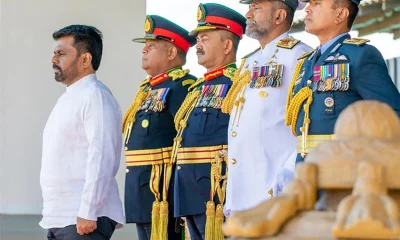
 News5 days ago
News5 days agoOffice of CDS likely to be scrapped; top defence changes on the cards
-

 Features5 days ago
Features5 days agoAn Absurd play in Parliament: Qualifications versus education
-

 Editorial7 days ago
Editorial7 days agoThe games they play
-

 Opinion6 days ago
Opinion6 days agoWhat AKD and NPP should bear in mind
-

 Midweek Review4 days ago
Midweek Review4 days agoEx-SLN seniors focus on seabed mining and Sri Lanka’s claim for the delimitation of the Outer Continental Margin
-
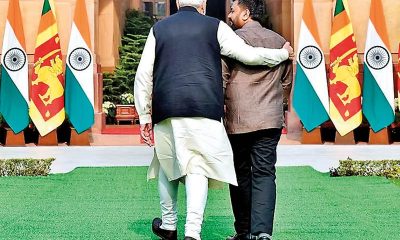
 Features7 days ago
Features7 days agoThe Government’s Term Tests & Results: The Good, the Bad and the Ugly
-

 Editorial6 days ago
Editorial6 days agoSeeyanomics, rhetoric and reality























